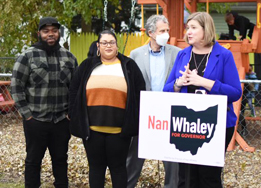
By Fletcher Word
Sojourner’s Truth Editor
Dayton Mayor Nan Whaley, a Democrat, has been at the helm of her hometown for seven years tackling a myriad of issues. She entered office during the midst of an opioid overdose crisis and, during her term, has encountered tornadoes, a mass shooting, hate rallies staged by Indiana residents and, of course, the COVID-19 pandemic.
By her estimate, Dayton has fared better than most would have thought possible during her time leading the city. She and her team have been dealing effectively with crime, for example, and developing an education plan that other communities would do well to emulate, indeed, some cities already have.
In fact, she may have the opportunity to see that more communities do emulate such a plan. Whaley has kicked off her campaign for governor. Crime and education are but two of the issues prominent in her platform – but very prominent indeed.
Bringing people together and police reform are the key elements of her approach to crime. In Dayton, the city has organized five different neighborhood groups, each comprised of an administration official and a community leader, along with dozens of committed citizens.
More than 140 recommendations have been issued by the working groups with an emphasis on ways to change recruitment and to improve relationships between law enforcement officials and the community, said Whaley, in a recent conversation with The Truth during her visit to Toledo.
“The relationship between police and the community has to be strong,” she said. “That’s the work citizens are doing now – it’s hard, tough work.”
Whaley emphasizes that such work cannot be conducted behind closed doors or without the input of the community. She takes issue with current Governor Mike DeWine’s approach to dealing with crime and his partnering with Republican Representative Phil Plummer of Montgomery County merely to increase funding without delving into root cause issues.
Plummer, Whaley noted, was sheriff of Montgomery County for 10 years and lodged more civil rights complaints than any jurisdiction other than Cuyahoga County.

“Both have spent their whole careers in a racist system, which is what the criminal justice system is,” she said.
Whaley is also an advocate of the state taking an interest in those folks who become and remain law enforcement officials.
“The state licenses barbers and those who work in beauty salons, and nurses,” she said. However, police officers, despite whatever training they receive from their cities or counties, are not licensed by the state. Bad officers who lose their jobs because of performance issues, can easily move from a big city position to one in the suburbs or smally towns.
“The state can really engage in licensure,” said Whaley.
One of Whaley’s key efforts as mayor has been to develop a plan to actively engage the city in education reform – pre-school education. The city has established a program, working through child-care centers, to offer high quality pre-school education to four-year olds so they are better prepared when they enter kindergarten.
The Dayton plan permits all families to enter their four-year olds in the program and working with the centers – as many of the centers as possible, has enabled the daycares to upgrade the quality of their educational programs. Initially, whether centers had three stars or no stars, they were able to participate in the program.
Now, said Whaley, “80 percent of our kids in Dayton are in a three-star pre-school.”

The Dayton program has proven beneficial on several fronts, said the mayor. On the education front, the data has shown that “we are closing the black achievement gap, particularly among black boys,” she said.
In addition, virtually all of the city’s pre-schools are small businesses, typically owned by black women. These are women who have started such operations because they love kids, said Whaley.
“We get a two-for: quality preschool and we help black women business owners succeed in their businesses,” she explained of the success the plan has had.
The response from the business owners has been gratifying. “We have the great data,” said Whaley, “but in addition these women are seeing great things with their businesses.”
Issues aside, regardless of the success, or perceived success, of Whaley’s tenure as mayor, her gubernatorial campaign must now translate that seven-year effort into a message that encourages Ohio voters to go to the polls and, then, push the Democratic button.
Whaley faces two major challenges – an incumbent opponent and a contest in a state which has become increasingly red over the last half decade or so.
The Republican candidate for president has won the state handily in the last two elections and in the 2018 election for statewide offices, the Republicans fared much better than their Democratic opponents.
“I don’t look at the state of Ohio as being a red state or a blue state,” said Whaley referencing the 2018 campaign in which Democratic U.S. Sen. Sherrod Brown won his race by eight points, the same margin by which Donald Trump carried the state in his re-election contest in 2020.
“It’s a pretty swingy state. But people are frustrated by being forgotten and ignored and it has nothing to do with what party you are in. People are working harder and harder, getting paid less and less and their bills go up and they are not getting the support from their government.”
Whaley views her campaign as having a decided advantage, not only because of the dissatisfaction of voters but also because of the corruption that plagues the current state administration.
“In 2018, we did not have the FBI calling the Ohio state house the most corrupt state house in the country,” she said of the First Energy scandal in which the federal government has accused state politicians of taking $61 million in bribes.
“Democrats do better when we have a corruption scandal,” she said of the current issues that have plagued Columbus Republicans. “The First Energy scandal, by a factor of 10, is more appalling than what we have seen in the past. It is THE issue. You cannot invest in the community; you cannot invest in the people if you have the most corrupt state in the country and the corruption will always get in the way of a complete overhaul to make sure government is working for the people.”
And the scandal and political atmosphere which led to it, encompasses more than the accused legislators, Whaley said. “Mike DeWine was complicit; he funded his daughter’s campaign … he hired Sam Randazzo. It gets worse and worse.”
“DeWine is weak,” Whaley added. “He is not strong enough to stand up to the extremists in his party; he has bought into the corrupt culture up there.”
The chance that the mayor of a mid-sized city could take the governor’s seat in Columbus has Whaley gleeful about the possibilities for the state as a whole – criminal reform, education reform, ending corruption …. and economic reform opportunities, above all.
“What would it be like if the State of Ohio said we are going to provide childcare for everyone?” she mused. “Twenty percent of women have decided not to go back to work because they can’t figure out childcare – post pandemic. So what would it be like if we invested that way?”
“We are trying to figure out how we can get that done,” the candidate added.
